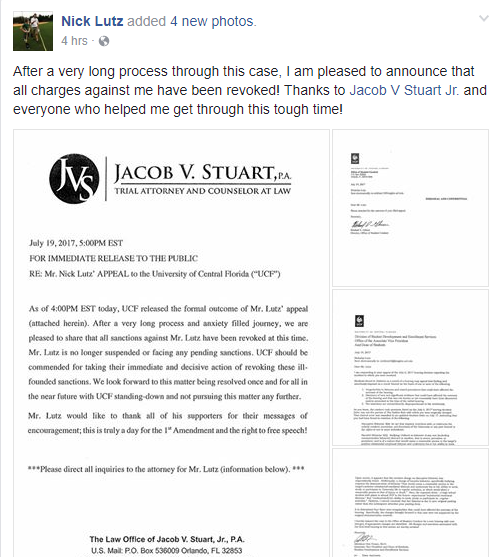Nicholas Lutz, the UCF student who got into trouble after posting a “graded” letter written by his ex-girlfriend on Twitter that went viral, had his disciplinary sanctions “revoked,” according to a public statement released by his attorney.
“Mr Lutz is no longer suspended or facing any pending sanctions,” the statement said. “UCF should be commended for taking their immediate and decisive action of revoking these ill-founded sanctions. We look forward to this matter being resolved once and for all in the near future with UCF standing down and not pursuing this matter any further.”
“This is truly a day for the 1st Amendment and the right to free speech!” it said.
The statement, released by attorney Jacob Stuart, who represents Lutz, came after a letter sent to Lutz by UCF’s Student Development and Enrollment Services said that it “remand[s] the case to the Office of Student Conduct for a new hearing with new charges, if appropriate charges are identified.”
Lutz came into the national spotlight after tweeting photos of a letter written by his ex-girlfriend, which he edited in red ink and “graded” it with a D-minus. UCF suspended Lutz for violating UCF policy on students who break local, state, and federal law, following a cyberbullying complaint filed by the ex-girlfriend to the Volusia County Sheriff’s Office.
The charges were later changed to “disruptive conduct” and “harmful behavior,” and Lutz was sanctioned with a two semester suspension and disciplinary probation for the rest of his academic career. He also had to create a presentation about the incident’s impact on others, write a five-page essay on the incident’s impact on his future and participate in the SDES’s mentorship program.
“Upon review, it appears the conduct on disruptive behavior was improvidently levied,” the SDES letter, which was posted by Lutz on Facebook, said. On the harmful behavior charge, the letter said that the ex-girlfriend — a high school student who “plans to attend UCF in the future” — experienced emotional distress, but that UCF “cannot conclude that her distress distress is due to your original posting rather than the subsequent attention your posting drew.”
Lutz’s case sparked a debate over whether universities can police students for what is being said on social media. Lyrissa Lidsky, a first amendment scholar and dean of the University of Missouri’s law school, tweeted Wednesday night, “Jurisdiction matters, and colleges should know where theirs end.”




